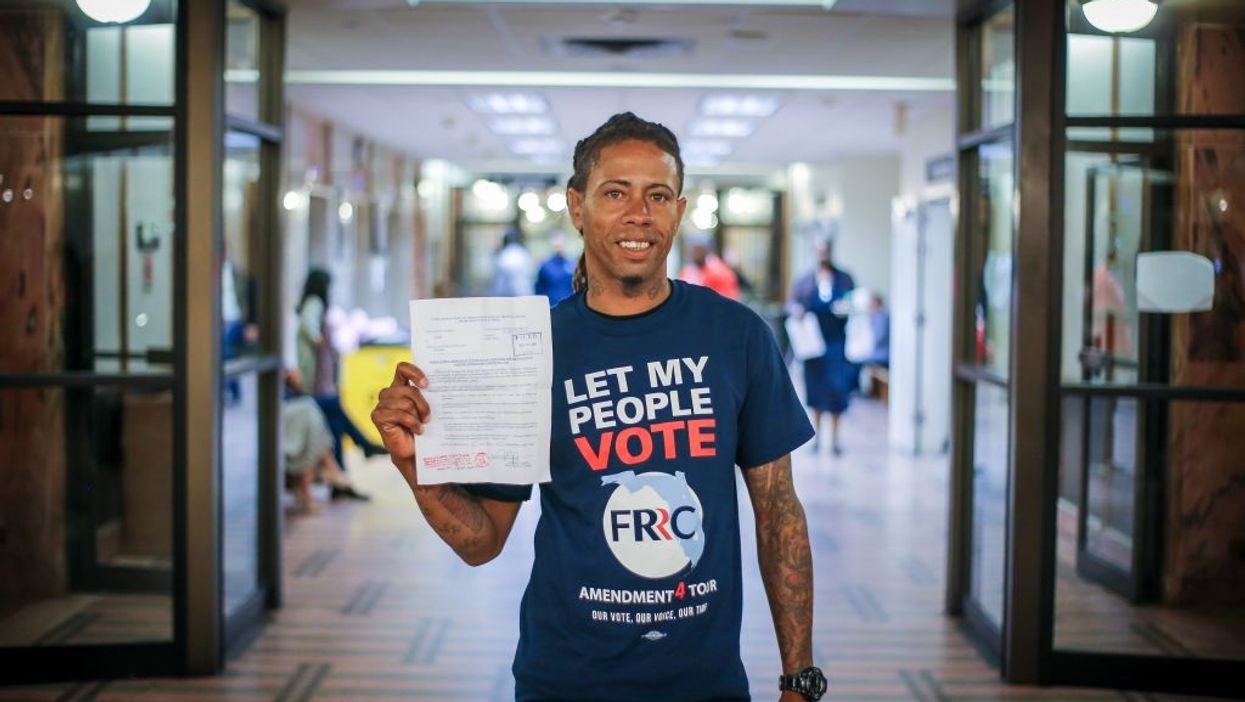In the most significant victory for voting rights this year, a federal judge in Florida has held unconstitutional a new state requirement that felons pay their fines, fees and court costs before getting to vote again.
If the ruling, issued Sunday night by Judge Robert Hinkle in Tallahassee, survives after an expected appeal by the state, hundreds of thousands more Floridians would be able to vote this fall in the most populous swing state — which is famous for two decades of extremely narrow margins in big elections.
The ultimate impact of the decision will depend on several factors, including how successful voting rights advocates are in identifying these potential new voters and getting them registered and to the polls.
Research has shown that felons who get the franchise back after their release from prison are far more likely to register as Democrats. Marc Meredith, a political scientist at the University of Pennsylvania, and a colleague found this to be true in researching the partisan allegiance of such voters in states including New York, New Mexico, North Carolina, Iowa, Rhode Island and Maine.
But while they may tend to be more Democratic, it is also true that they are also less likely to vote at all.
Nonetheless, Hinkle's decision is a watershed moment in a year when a central story about American democracy is whether access to the voting booth should be made easier or kept difficult — and most of those questions are being forced by lawsuits across the country.
In this case, the Republican-majority Legislature and GOP Gov. Ron DeSantis produced a law last year requiring felons to pay all their court-ordered financial obligations before registering — saying that was what constituted completion of their sentence. The measure was written after 65 percent of the state's voters in 2018 decided to restore voting rights for as many as 1.4 million felons who have completed prison, probation and parole, the largest single restoration of the franchise in the nation in a generation.
Hinkle's 125-page opinion called the law a "pay-to-vote system."
There's strong reason to believe the state's expected appeal would succeed at the next level, the 11th Circuit Court of Appeals in Atlanta, since that court has already rebuffed a similar but preliminary challenge in the case.
The court unanimously upheld a ruling last October by Hinkle temporarily blocking the law, in which he held that requiring felons to repay all of their fines and fees amounted to a poll tax. Poll taxes were used in the South as a way to bar poor black people from voting and were barred by a constitutional amendment in 1964
"Now, after a full trial on the merits, the plaintiffs' evidence has grown stronger," that the court costs are a de facto poll tax, Hinkle wrote in Sunday's ruling. He presided over an eight-day trial in April, held by teleconference because of the risk of the coronavirus.
Five different lawsuits filed on behalf of convicted felons and civil rights groups were consolidated into one.
In Sunday's decision, Hinkle ruled that felons can be required to pay what courts order them to, but only if they can afford it.
There was no immediate response from DeSantis, GOP Secretary of State Laurel Lee, or President Trump, who has in recent days been weighing in through Twitter on all the voting process changes he objects to.
One issue that clearly hurt the state's case was its inability to come up with a consistent and clear method for determining what is owed by each felon. Hinkle made reference to the issue several times during court hearings and mentioned it again in his ruling.
He noted that a professor working with a team of doctoral candidates attempted to determine how much a sampling of 153 felons owed and found inconsistencies in all but three of the cases they studied.
The exact number of people who might find their voting rights restored is also in dispute. Some estimate several hundred thousand. Others peg the figure at 774,000. Hinkle put the number at nearly 1 million. (The state constitutional amendment, known as Amendment 4, continues to deny the right to vote to murderers and sex criminals.)
Whatever the number, voting rights and criminal justice reform groups hailed the decision.
"This is a landmark victory for voting rights!" Danielle Lang of the Campaign Legal Centerwrote in an email. CLC filed one of the lawsuits in behalf of three people with felony convictions.
"This ruling is not only a victory for our clients and voting rights activists in Florida, but is an important step towards dismantling financial barriers to the ballot box across the country," said Nancy Abudu, deputy legal director for the Southern Poverty Law Center.
Florida's congressional and legislative primaries are in 12 weeks, and it's unclear whether any appeals could be resolved by then. The Supreme Court does not customarily hear new cases before October.
The state now has 29 electoral votes, more than any state except solidly blue California and traditionally red Texas, and it has been carried by the presidential winner six straight times — almost always by extraordinary narrow margins. George W. Bush's 537-vote margin, upheld by the Supreme Court in 2000, is the most famous, but Trump prevailed four years ago by only 113,000 votes out of 9.5 million cast — a margin of just 1 point over Hillary Clinton.




















Trump & Hegseth gave Mark Kelly a huge 2028 gift